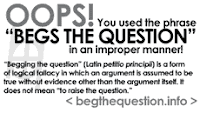 From Dale Allison, "The Historians Jesus and the Church", Beverly Roberts Gaventa and Richard B. Hays, Seeking the Identity of Jesus: A Pilgrimage (Grand Rapids: Eerdmans, 2008), 79-95 (81):
From Dale Allison, "The Historians Jesus and the Church", Beverly Roberts Gaventa and Richard B. Hays, Seeking the Identity of Jesus: A Pilgrimage (Grand Rapids: Eerdmans, 2008), 79-95 (81):"None of what has been said gives us good reason to attribute Mark 9.43-48 to someone other than Jesus, and my own strong inclination has always been that the verses go back to him. But if I am candid, I am not really sure what arguments or criteria I might muster to persuade others who are inclined to a different opinion or even no opinion at all. I can say that the language is vivid and shocking. My mind's eye beholds a bloody stump and an empty eye socket when it encounters these words, from which it follows that if Jesus did say something like Mark 9.43-48, it would stick in the memory. But this begs the question: Did he really say something like it?"
Incidentally, the article is fantastic, and I would like to blog about it in due course, but I thought I would note this incorrect usage of "beg the question" since the topic has been raised today.
7 comments:
I don't know if its even worth it. I think our ability to get people to get BTQ right is about as likely as getting people to realize that "passive" does not mean "any construction vague with respect to human agency" and has nothing at all to do with whether or not politicians are trying to avoid responsibility, which can be done quite easily in the active voice as it can in the passive:
http://languagelog.ldc.upenn.edu/nll/?p=1227
This raises a question for me. As biblical scholars are fond of pointing out, words are meaningless apart from context. So "beg the question" is a meaningless phrase apart from context. If this phrase is used frequently to mean "raise a question", then perhaps we have to accept this as an alternative usage of the phrase. What do you think?
No one should ever get it wrong if we used the Latin phrase, petitio principii, unless of course the gratuitous use of Latin is a pet peeve.
So the language is moving on! Shock, horrow. "Begging the question" is now coming to mean "poses the hitherto unanswered question". Big deal.
Get a new phrase to replace the old one. The over reliance on, and contstant referencing of "fallacies" is one of bloggings most inane activities. An activity, I would posit, which is directly correlated to the use of wikipedia. . . .
The incorrect use of "beg the question" is certainly common, but I don't think Allison is guilty of it here. In the context of whether Mark 9:43-48 goes back to the historical Jesus, it is literally assuming the conclusion to argue, "if Jesus did say something like Mark 9.43-48, it would stick in the memory".
The paragraph actually makes less sense if we understand "begs the question" as "raises the question", since Allison was discussing the verses' origin before mentioning the "if Jesus did say..." argument.
Good thoughts, Edward. I think you may be right, though it looks like Allison means "raises the question" given the colon & the following question that is articulated.
Post a Comment